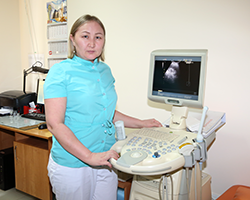Altynai Karakhoishiyeva: helping women give birth during the COVID-19 pandemic

WHO
Altynai Karakhoishiyeva has been working as an obstetrician-gynaecologist at the maternity unit in City Maternity Hospital No. 1 in Almaty, Kazakhstan, for 15 years. She decided to continue working there when it became an isolation hospital for mothers suspected of having COVID-19.
In March 2020, when the first cases of COVID-19 were detected in Nur-Sultan and Almaty, the WHO Country Office in Kazakhstan provided essential information to those health departments to help train health-care workers. These trainings helped to prepare health-care responders to provide the best possible care and to understand the steps to take when confronted with suspected COVID-19 infections.
Over 2 days, infectious disease specialists from the health department trained the staff of City Maternity Hospital No. 1 on how to protect themselves and to care for those with COVID-19. The goal for the team was to learn everything they could about this new virus using national guidelines based on WHO recommendations. On 9 March, the Hospital opened.
“The very next day, from 6:00 in the morning, we began to receive people who had been in close contact with confirmed COVID-19 cases,” recalls Altynai. “Two days later, we also started to receive pregnant women who were in quarantine, many of whom had tested positive for the virus. On this day, I participated in 3 deliveries and 1 operation. All the women had COVID-19.”
Fear and loneliness
Altynai says that before the COVID-19 pandemic began, working in the Hospital was easier and the conditions for women giving birth were better. There were enough nurses who could provide psychological support during labour, especially for first-time mothers. With the pandemic, she says that women in labour feel more alone during their contractions and pains, which can make them more fearful. She also fears for herself and her colleagues.
“When I work with the infected patients at the maternity unit, I have no fear, but deep down, I worry about my family and my children. When we see that both the birthing mother and the newborn baby are well, it becomes easier to manage my worries.”
Resilience in the face of challenges
For the staff, wearing protective equipment 24 hours a day is very difficult. “Sometimes masks and respirators cause bruising or redness, and some people are allergic to the material. They also need to be changed regularly as they become damp. This is a hard time for all the health workers in the world, and all of us have the same challenges,” Altynai says.
“In the hospital, anything can happen,” she notes, “For example, a woman who was in a stable condition can suddenly deteriorate. There are also times when you need to act quickly to save the life of a baby. Despite all this, I like working in the Hospital. I think I’m a resilient person, and when I overcome difficulties I get the motivation to continue. The work is difficult, but when a woman takes her baby in her arms and thanks you, everything else is forgotten.”



